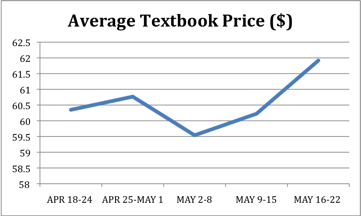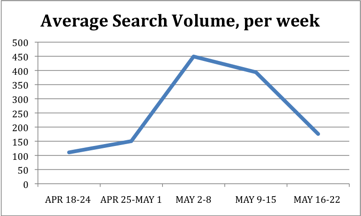The biggest part of the year for textbook buyback is five weeks between April and May. Timing when to sell your textbooks during that span can be a surprising difference in the price you get for your books. Knowing the supply and demand of textbooks during this period can earn savvy students more cash.
Quick Quote: Find out what your textbooks are worth
CampusBooks.com compiled textbook buyback data for this buyback period and published the results for all to see. The study compared the buyback prices of 20 various textbooks over a five week span, focusing on the five weeks between April and May when most students sell back their books.
Recommended Resources:
The report found:
- Search volume and average price were opposed. The weeks of May 2-8 and May 9-15, the “peak” of the buyback season, saw huge search volume, and at the same time, the lowest average prices. Meaning: as more students searched for the buyback price of a textbook, the amount offered from the buyback website was at its lowest.
- The highest average prices offered for textbooks (as well as many of the highest overall) were seen in the week after the rush.
- Choosing the right time to sell a textbook can result in getting up to 11% more for the book.
- Your best bet is to sell at the beginning or at the end of this 5-week buyback period. The best times to sell textbooks are at the beginning of April, for consistency, or the end of May, for the highest prices.


Study Conclusion
Overall, the data showed that the highest prices were offered once the rush to sell textbooks was over (toward the end of May). In some cases, holding on to the book until the start of the next semester may be worth the risk. At that point in time the demand for the textbook will be much higher while the supply will start to decrease. Obviously you wouldn’t want to do this if a new edition was set to come out. You can typically search Amazon.com for future editions of the textbook as the site will typically show the planned publication date for the next edition.
Even if buyback sites are offering little or no money for your textbook (often because they are overstocked), there may still be demand for your book. Jeff Cohen of CampusBooks.com suggests, “While you might not get cash from a buyback site you can possibly sell the book on a marketplace and earn even more."
Other tips from Jeff Cohen:
- If you plan to sell textbooks back on campus do so on the very first day of buyback. You may not get the highest price, but the data shows that the highest average price is during that period. It’s the safest bet, for sure.
- Ask the bookstore if the book will be used for the next semester, if they tell you "no" then you are most likely getting a wholesale or internet price. Wholesale books will go back to a central distribution center and then sold to another school. Internet retail prices are purchased for resale over the internet. Both are a lower value buyback than a retail book that will stay on your campus and be used the next semester.
Get textbook buyback quotes at sites like Chegg, eCampus, and CampusBooks.